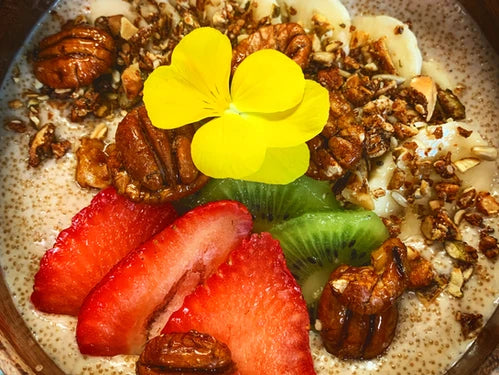The study of the gut and its connectivity to the rest of the body is vast. This is why we are constantly researching the science behind it and learning how the food on our plate plays a huge role in the way we feel and the way we think. In our previous blogpost we learned that fiber, plant diversity, and fermented foods are key components to a healthy, happy gut. A well-balanced gut microbiome is essential for immunity, hormonal balance, cognition, and metabolism (1). Damage to our gut can help to ignite issues including autoimmune diseases, asthma, food sensitivities, allergies, type 1 diabetes, rheumatoid arthritis, and mental health struggles (2).
The Mind-Gut Connection

Our mind and gut are tightly joined. Our vagus nerve (pronounced vey-guhs, as in Las Vegas) starts in the brain and runs through our body carrying important sensory and motor information. What happens in Vegas stays in Vegas does not apply here though. You see, the word vagus comes from the Latin term for wandering. It carries information from the brain to internal organs and controls our ability to speak, swallow, and taste; as well as regulate gut motility, mood, and heart rate (3). Our gut instincts are even connected to the brain through the vagus nerve (4). The gut-brain axis is a bidirectional communication network which runs between the central nervous system (the brain and the spinal cord) and the enteric nervous system (lies within our gut) (5). The Enteric nervous system, referred to as our “second brain,” signals hormone secretion, controls digestion, and responds to dietary changes. The vagus nerve connects these two systems which link emotional and cognitive centers of the brain with the intestinal activity (6).

As cold and flu season approaches, it’s important to know that over 70% of our immune system lies within the gut. In addition to playing a role in digestion, the vagus nerve also works within the gut to control immune responses during times of illness (7). If a person is frequently sick or having longer than usual recovery times, the body may be putting out a signal that something is not right within the gut.
Let’s take a look at some simple steps to help us heal our gut microbiome, and therefore, promote healthy brain activity.

-
Eat a wide variety of plants. A plant-based lifestyle includes nutrient-dense and antioxidant-rich fruits and vegetables which are wonderful “brain food.” Whole grains, nuts, seeds, and legumes in addition to fruits and vegetables ensure a high fiber diet that the gut microbiome will thrive on.
-
Work fermented foods into your diet. This can include kimchi, sauerkraut, miso, or tempeh. Fermented foods are a great way to get natural probiotics (which are microorganisms that live within the gut)
-
Try to remove highly processed foods from the diet which could include harmful chemicals and oils that cause inflammation.
-
Processed and/or non-organic foods may also include unknown pesticides which could lead to an imbalance in gut bacteria.
-
Excessive medications and antibiotics may cause gut permeability and dysbiosis.(8) *consult your doctor before making any changes with your medications.
P.S. & Co. offers only whole food, organic, gluten-free, and plant-based items - which let the microbiome thrive. Some favorite options for a healthy gut and healthy mind are below:
-
Organic Protein-Packed Amaranth Porridge with Fresh Fruit, Maple Pecans and Fresh Jam
__________________________________________________________________________________
1 Bulsiewicz, Will (2022). 8. Fiber fueled: The plant-based gut health program for losing weight, restoring your health, and... optimizing your microbiome. Avery Pub Group.
2 Xu H, Liu M, Cao J, Li X, Fan D, Xia Y, Lu X, Li J, Ju D, Zhao H. The Dynamic Interplay between the Gut Microbiota and Autoimmune Diseases. J Immunol Res. 2019 Oct 27;2019:7546047. doi: 10.1155/2019/7546047. PMID: 31772949; PMCID: PMC6854958.; Bulsiewicz, Will (2022). 16. Fiber fueled: The plant-based gut health program for losing weight, restoring your health, and... optimizing your microbiome. Avery Pub Group.
3 Vagus nerve: Gastroparesis, Vagus Nerve Stimulation & Syncope. Cleveland Clinic. (n.d.). Retrieved November 30, 2022, from https://my.clevelandclinic.org/health/body/22279-vagus-nerve#:~:text=The%20vagus%20nerve%2C%20also%20known,can't%20consciously%20control%20them.
4 Klarer, M., Arnold, M., Günther, L. Winter, C. Langhans, W., & Meyer, U. (2014) Gut vagal afferents differentially modulate innate anxiety and learned fear. J Neurosci 34(21), 7067–7076.
5 Carabotti M, Scirocco A, Maselli MA, Severi C. The gut-brain axis: interactions between enteric microbiota, central and enteric nervous systems. Ann Gastroenterol. 2015 Apr-Jun;28(2):203-209. PMID: 25830558; PMCID: PMC4367209.
6 ibid
7 Wiertsema SP, van Bergenhenegouwen J, Garssen J, Knippels LMJ. The Interplay between the Gut Microbiome and the Immune System in the Context of Infectious Diseases throughout Life and the Role of Nutrition in Optimizing Treatment Strategies. Nutrients. 2021 Mar 9;13(3):886. doi: 10.3390/nu13030886. PMID: 33803407; PMCID: PMC8001875.
8 Tulstrup MV, Christensen EG, Carvalho V, Linninge C, Ahrné S, Højberg O, Licht TR, Bahl MI. Antibiotic Treatment Affects Intestinal Permeability and Gut Microbial Composition in Wistar Rats Dependent on Antibiotic Class. PLoS One. 2015 Dec 21;10(12):e0144854. doi: 10.1371/journal.pone.0144854. PMID: 26691591; PMCID: PMC4686753.





Leave a comment
This site is protected by hCaptcha and the hCaptcha Privacy Policy and Terms of Service apply.